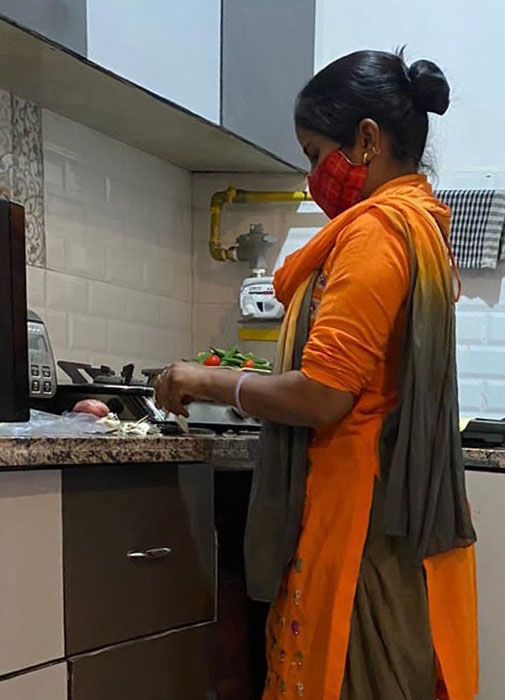‘Your driver is vaccinated’: How COVID-19 vaccines saved Delhi’s gig economy
Daily wagers have been able to get their jobs back following vaccination.
- 6 April 2022
- 4 min read
- by Shakoor Rather

Thirty-year-old Pooja Rani lost work when the first COVID-19 wave hit India’s national capital Delhi in March 2020.
Rani, who works as a cook in South Delhi’s Saiduljab area, says “All the households where I worked told me, quite suddenly, not to come to work; initially due to the COVID-19 lockdown and later because they were scared that they might catch the virus.”
“When the first wave ended, I thought business would return to normal, but people were still scared to book rented taxis out of fear of catching the virus.”

“My husband, who works as a security guard in a residential building, was also laid off from work. Since we could not afford to pay rent and sustain ourselves, we decided to go back to our village,” adds Rani, who hails from North India’s Rajasthan state.
Rani is one of the thousands of migrant workers who suddenly found themselves out of work as the COVID-19 pandemic gripped the country and the world.
According to the Ministry of Labour and Employment, more than 1.3 million migrant workers and their families left Delhi for their home villages and towns during the second wave of the pandemic.
“When the first wave ended, I thought business would return to normal, but people were still scared to book rented taxis out of fear of catching the virus,” adds Jitendra Singh, a driver who works with an app-based taxi service operating in the National Capital Region (NCR).
As India faced its second – and more deadly – COVID-19 wave in March 2021, the country started vaccinating, firstly health care workers and the elderly, then by June 2021, all adults.
For thousands of migrant labourers working across the essential and non-essential service sector, the vaccination programme came as a big boost, helping them to return to their jobs by improving confidence among consumers.
Delhi-based psychologist Shweta Sharma noted that the fear of being infected or “nosophobia” was so high during the first COVID-19 wave that it resulted in the highest social and emotional distance.
Have you read?
“The vaccination drive, however, brought new hope to everyone’s life and daily wage workers started getting back their jobs,” says Sharma.
“It became more prominent when Omicron’s effects were less fatal and, with most of the population vaccinated, this built strong confidence in people to get the vaccination and get back to day-to-day life,” she adds.
When the third COVID-19 wave hit the national capital, most workers had received the second dose of the vaccine.
Experts believe it was due to the 'hybrid' protection offered by vaccination and past infections that made the Omicron wave in January 2022 milder in India, even as the number of daily infections reached an all-time high.
“By the time the third COVID-19 wave, driven by the Omicron variant, hit Delhi, most workers were going about their work in a normal fashion, and there were fewer job losses,” Sharma says.
“When a taxi user sees on the app that ‘the driver is vaccinated’, it gives them the confidence to travel again. Although we still have to follow protocols and be cautious, the vaccines are our saviours.”
Both Rani and her husband have returned to their jobs in Delhi after being fully immunised against COVID-19.
“We were able to start where had we left off and send our children back to school. Getting vaccinated certainly helped,” says Rani.
Ruchika, 31, a media professional living in West Delhi’s Mayur Vihar area, received her second COVID-19 vaccine shot in October 2021.
“Vaccination was key to rebooting life. I was waiting to complete my two doses of vaccine so that I could call back my cook and driver who were already fully vaccinated in August,” says Ruchika.
Many companies that provide app-based services, including salons, grocery, and food delivery, started displaying in their apps that the service provider was “vaccinated” and that their temperature was checked ahead of performing the job.
“When a taxi user sees on the app that ‘the driver is vaccinated’, it gives them the confidence to travel again. Although we still have to follow protocols and be cautious, the vaccines are our saviours,” Singh adds.
Sharma notes that a sense of safety automatically comes to mind when vaccination status is adequate.
“We started using new service providers who have the facility to easily check vaccination status, which gives us a sense of security,” Sharma adds.






